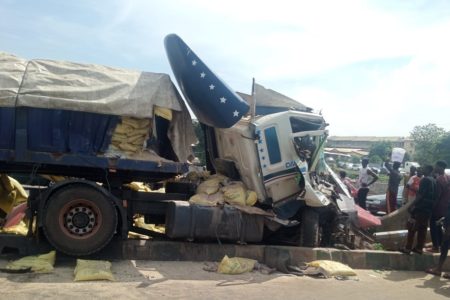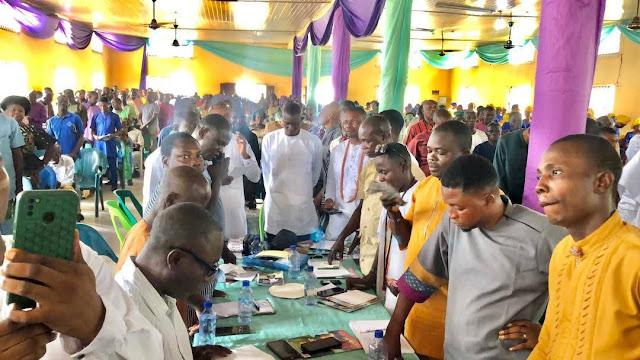In a devastating incident that has sent shockwaves through Nigeria’s capital, four individuals lost their lives following a violent confrontation on the Kubwa Expressway in Abuja on September 4, 2025. The tragic event, which involved a car overturning amidst a clash between hoodlums and security operatives, underscores the growing concerns over public safety and security in Nigeria’s urban centers. This article provides a comprehensive account of the incident, its causes, the response from authorities, and the broader implications for road safety, security, and community relations in Abuja and beyond.
Details of the Incident
The fatal incident occurred on the Kubwa Expressway, a major arterial road connecting various parts of Abuja, the Federal Capital Territory (FCT). According to reports from the Federal Road Safety Corps (FRSC), the tragedy unfolded when a group of hoodlums engaged in a violent confrontation with security operatives, leading to chaos on the highway. Amidst the melee, a car overturned, resulting in the immediate deaths of four individuals. The exact circumstances leading to the vehicle’s overturning remain under investigation, but preliminary reports suggest that the chaotic situation on the road may have contributed to the driver losing control.
The Kubwa Expressway, known for its heavy traffic and strategic importance, is a vital route for commuters traveling to and from Abuja’s city center and surrounding areas, including Kubwa, a densely populated satellite town. The expressway is often bustling with activity, with vehicles ranging from private cars to commercial buses navigating its lanes. However, it has also been a hotspot for security challenges, including armed robbery, traffic violations, and occasional clashes involving local youths and security forces.
Eyewitness accounts, as reported by local media, paint a grim picture of the scene. The confrontation reportedly began as a dispute between a group of young men and security operatives, possibly over an enforcement action or a misunderstanding. The situation escalated rapidly, with the hoodlums allegedly resorting to violence, including throwing projectiles and obstructing traffic. In the ensuing chaos, a vehicle—whose make and model have not been disclosed—overturned, leading to the tragic loss of life. The identities of the deceased have not been officially released, pending notification of their families, but the incident has sparked widespread grief and outrage among residents of Abuja.
Response from Authorities
The Federal Road Safety Corps (FRSC), Nigeria’s lead agency responsible for road safety, was among the first to respond to the incident. FRSC officials confirmed the deaths and reported that emergency response teams were dispatched to the scene to manage the situation. The agency’s personnel worked to clear the wreckage, provide medical assistance to any survivors, and restore normal traffic flow on the expressway. The FRSC also issued a statement expressing condolences to the families of the deceased and emphasizing the need for improved road safety and public order.
The Nigeria Police Force, which likely played a role in the confrontation as part of the security operatives involved, has not issued a detailed statement on the incident. However, sources indicate that the police are investigating the circumstances surrounding the clash and the subsequent accident. Key questions under investigation include the cause of the confrontation, the actions taken by both the hoodlums and security operatives, and whether any procedural lapses contributed to the escalation of the situation.
The FCT Administration, responsible for governance and security in Abuja, has also been drawn into the response efforts. The incident has raised concerns about the effectiveness of security measures in the capital, prompting calls for a review of protocols governing public order and crowd control. The FCT Minister, whose office oversees the administration of the capital territory, is expected to address the incident and outline measures to prevent similar occurrences in the future.
Broader Context: Security Challenges in Abuja
The tragic incident on the Kubwa Expressway must be viewed within the broader context of security challenges facing Abuja and Nigeria as a whole. While Abuja is often regarded as one of Nigeria’s safest cities, with a relatively low crime rate compared to other urban centers like Lagos and Port Harcourt, it is not immune to security issues. Recent years have seen a rise in incidents involving hoodlums, armed robbers, and kidnappers in the FCT, particularly in satellite towns like Kubwa, Gwagwalada, and Nyanya.
The term “hoodlums” in the Nigerian context often refers to groups of young men, sometimes unemployed or disenfranchised, who engage in disruptive or criminal activities. These groups may be motivated by economic hardship, social grievances, or a lack of opportunities, leading to confrontations with security operatives or community members. In some cases, such clashes are triggered by enforcement actions, such as police raids or checkpoints, which can escalate tensions if not handled with care.
The Kubwa Expressway incident highlights the delicate balance between maintaining public order and avoiding escalation in volatile situations. Security operatives, tasked with ensuring safety and enforcing the law, often face challenging circumstances when dealing with large crowds or aggressive individuals. However, heavy-handed tactics or a lack of de-escalation strategies can exacerbate tensions, leading to outcomes like the one witnessed on September 4, 2025.
Road Safety Concerns in Nigeria
The overturning of the vehicle during the confrontation raises critical questions about road safety in Nigeria, particularly on major highways like the Kubwa Expressway. Nigeria has one of the highest road traffic fatality rates in the world, with the World Health Organization estimating over 40,000 deaths annually due to road accidents. Factors contributing to this grim statistic include poor road conditions, reckless driving, inadequate vehicle maintenance, and a lack of adherence to traffic regulations.
The FRSC has been at the forefront of efforts to improve road safety, implementing measures such as speed limit enforcement, driver education programs, and vehicle inspections. However, incidents like the one on the Kubwa Expressway underscore the need for a multi-faceted approach that addresses not only driver behavior but also external factors, such as public disturbances, that can lead to accidents. The chaos caused by the confrontation likely created hazardous conditions on the expressway, contributing to the vehicle’s loss of control.
Moreover, the incident highlights the importance of emergency response capabilities. The FRSC’s swift action in clearing the wreckage and assisting survivors is commendable, but Nigeria’s emergency response infrastructure remains underdeveloped in many areas. Limited access to ambulances, poorly equipped hospitals, and delays in response times can exacerbate the consequences of accidents, making it critical for authorities to invest in improving these systems.
Socioeconomic Factors and Public Safety
The violent confrontation that precipitated the accident is symptomatic of deeper socioeconomic challenges in Nigeria. High unemployment rates, particularly among youth, have fueled frustration and social unrest in many parts of the country. According to the National Bureau of Statistics, Nigeria’s unemployment rate stood at 33.3% in 2024, with youth unemployment significantly higher. This economic hardship, combined with limited access to education and opportunities, can drive young people toward activities that disrupt public order, as seen in the Kubwa Expressway incident.
In Abuja, the rapid urbanization of satellite towns like Kubwa has led to population growth that outpaces infrastructure development. Many residents in these areas face challenges such as inadequate housing, limited access to basic services, and a lack of recreational facilities for youth. These conditions can create a sense of disenfranchisement, contributing to tensions between communities and security operatives.
Addressing these root causes requires a comprehensive approach that combines economic empowerment, education, and community engagement. Programs aimed at providing vocational training, creating jobs, and improving access to social services can help reduce the likelihood of such incidents. Additionally, community policing initiatives, which foster collaboration between law enforcement and local residents, can build trust and prevent escalations like the one witnessed on the expressway.
Community Reactions and Social Media Discourse
The tragic incident has sparked widespread reactions among Abuja residents and Nigerians at large. On social media platforms like X, users have expressed grief over the loss of lives, with many calling for accountability and justice for the victims. Some have criticized the security operatives involved, questioning whether their actions contributed to the escalation of the confrontation. Others have highlighted the need for better crowd control measures and de-escalation training for law enforcement.
The incident has also reignited discussions about the role of hoodlums in urban areas and the factors driving their actions. Community leaders and activists have called for dialogue between authorities and youth groups to address grievances and prevent future clashes. The hashtag #KubwaExpresswayTragedy has gained traction on X, with users sharing condolences, personal accounts, and suggestions for improving public safety in Abuja.
Implications for Policy and Governance
The Kubwa Expressway incident has significant implications for policy and governance in Nigeria, particularly in the areas of security, road safety, and urban planning. For the FCT Administration, the tragedy underscores the need for a robust security framework that balances enforcement with community engagement. Strategies such as community policing, intelligence-led operations, and youth empowerment programs can help prevent similar incidents in the future.
From a road safety perspective, the incident highlights the need for stricter enforcement of traffic regulations and improved infrastructure on major highways. The Kubwa Expressway, like many roads in Nigeria, suffers from issues such as inadequate signage, poor lighting, and a lack of pedestrian pathways. Addressing these deficiencies can reduce the risk of accidents, particularly in high-traffic areas prone to disruptions.
The incident also raises questions about the coordination between agencies like the FRSC, Nigeria Police Force, and the FCT Administration. Effective collaboration is essential to managing crises and ensuring a swift response to incidents. Establishing clear protocols for handling public disturbances and integrating emergency response systems can enhance the authorities’ ability to prevent and mitigate such tragedies.
Broader National Context
The Kubwa Expressway incident must be viewed within the broader context of Nigeria’s security and socioeconomic challenges. The country has faced a range of issues in recent years, including insurgency in the northeast, banditry in the northwest, and separatist agitations in the southeast. While Abuja has been relatively insulated from these challenges, incidents like the one on the Kubwa Expressway serve as a reminder that no part of the country is entirely immune to security threats.
The incident also reflects the broader struggle to balance economic development with social inclusion. Nigeria’s rapid population growth and urbanization have strained resources and infrastructure, particularly in cities like Abuja. Addressing these challenges requires a holistic approach that combines economic reforms, infrastructure investment, and social programs aimed at empowering marginalized groups.
Moving Forward: Lessons and Recommendations
The tragic loss of four lives on the Kubwa Expressway is a sobering reminder of the need for comprehensive reforms to address security and road safety in Nigeria. Several key recommendations emerge from this incident:
Enhanced Security Training: Security operatives must receive training in de-escalation techniques and crowd control to prevent confrontations from escalating into violence. Community policing initiatives can also foster trust and collaboration between law enforcement and residents.
Improved Road Safety Measures: The FRSC and other agencies should intensify efforts to enforce traffic regulations, improve road infrastructure, and educate drivers on safe practices. Regular vehicle inspections and speed limit enforcement can reduce the risk of accidents.
Youth Empowerment Programs: Addressing the root causes of unrest requires investment in youth empowerment, including job creation, vocational training, and access to education. These programs can reduce the likelihood of young people engaging in disruptive activities.
Strengthened Emergency Response: Nigeria must invest in improving its emergency response infrastructure, including ambulances, trauma centers, and communication systems, to ensure timely assistance during crises.
Community Engagement: Authorities should engage with community leaders, youth groups, and civil society organizations to address grievances and promote dialogue. This can help prevent misunderstandings that lead to confrontations.
Conclusion
The tragic incident on the Kubwa Expressway, which claimed four lives on September 4, 2025, is a stark reminder of the challenges facing Nigeria’s urban centers. The violent confrontation between hoodlums and security operatives, culminating in a fatal car overturn, highlights the need for improved security, road safety, and community engagement. The response from the FRSC and other authorities demonstrates a commitment to addressing the immediate aftermath, but long-term solutions require a multi-faceted approach that tackles the root causes of unrest and ensures safer roads.
As Nigeria mourns the loss of lives and reflects on this tragedy, there is an opportunity to learn from the incident and implement reforms that enhance public safety and social cohesion. By addressing issues such as youth unemployment, inadequate infrastructure, and security training, Nigeria can work toward a future where such incidents are less frequent and communities are more united. The Kubwa Expressway tragedy is a call to action for all stakeholders—government, security agencies, and citizens—to collaborate in building a safer and more prosperous nation.






